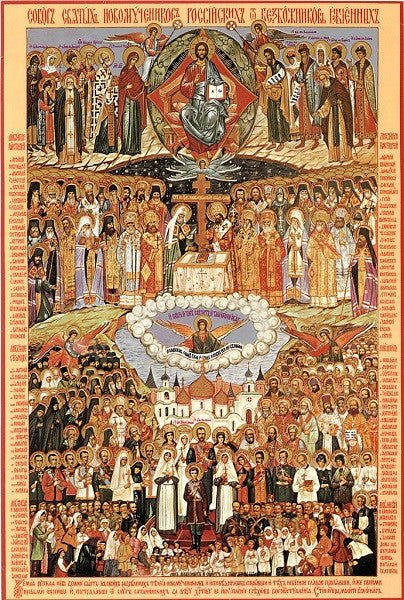Sermon on the New Martyrs of Russia & the Sunday of the Publican and the Pharisee 2017

+In the name of the Father, and of the Son, and of the Holy Spirit. Amen.
What kind of men and women become martyrs? A century ago in Russia there lived all sorts of people. Some became the holy new martyrs and confessors whom we celebrate today. Some remained ordinary men and women who quietly remained faithful to the Church. Some became renovationists. Some became indifferent. Some became apostates. And some became persecutors.
What is it within each of our hearts that determines our destiny and eternal fate? For what kind of open or hidden virtue does the Lord grant the supreme gift of a martyr’s crown? And which of our many sins and passions do we need to fear the most, which can so corrupt and sicken our souls that we become capable even of mocking, torturing and slaughtering God’s faithful servants?
The Lord often chooses to disclose His mysteries and to grant us a glimpse of His inscrutable judgments through the Church calendar, through the intersection of our day-to-day lives with the eternal realm. And so it is that God has perhaps chosen to give an answer to these questions—so needful for each of us to ask and to resolve in these modern times which are so quickly changing—in the intersection today of the feast of the New Martyrs & Confessors of Russia with the Sunday of the Publican and the Pharisee.
To explain what I mean, I will read a short story included by Bishop Tikhon of Stretensky Monastery in his book Everyday Saints. It reveals an answer to the questions of today’s sermon that might perhaps be shocking and scandalous to some Christians, or at the very least a bit unexpected. But it is shocking to us in the same way that the Lord’s parable of two thousand years ago was shocking to the Jewish sensibilities and piety of that day. And that is because the two stories are saying exactly the same thing.
SOMEWHERE IN THE depths of Russia before the Revolution there was a monastery that had a bad reputation in the neighborhood. It was said that its monks were all idlers and drunkards. During the Civil War the Bolsheviks arrived in the town that was closest to the monastery. They gathered together its inhabitants in the market square, and then they dragged the monastery’s monks out in a convoy.
The commissar loudly yelled at the people as he pointed to those men in black: “Citizens! Townsfolk! You know these drunkards, gluttons, and idlers better than I do! Now their power has come to an end. But so that you will understand more fully how these vagabonds have fooled the workers and peasants for centuries, we will throw their cross and their Scriptures into the dust before them. Now, before your very eyes, you will see how each of them will stamp upon these tools of deceit and enslavement of the people! And then we will let them go, and let the four winds scatter them!”
The crowd roared. And as the people cheered, up walked the monastery’s abbot, a stout man with a meaty face and nose all red from drinking. And he said as he turned to his fellow monks: “Well, my brothers, we have lived like pigs, but let us at least die like Christians!”
And not a single one of those monks budged. That very day all their heads were chopped off by the sabers of the Bolsheviks.
My brothers and sisters, let us above all beseech the Lord to grant us humble hearts. Even if we are torn apart every minute of every day by our passions, even if we totally covered in the filth of our own sins and we fall again and again to temptation in the same pointless and petty way, let us think of the monks of this story who became holy martyrs, and who stand now interceding for us before the throne of God. Let us remember the teaching of the Holy Fathers that humility can take the place of every virtue and can cover every sin. Let us think to ourselves that perhaps the Lord is allowing us to wallow in our vices because in His wisdom He sees that our virtues would make us even worse. Let us think that perhaps only our wretchedness is capable of leading our hardened hearts at long last to humility and faith. And let us remember the words of todays’ parable, the mysterious and righteous judgments of our Savior and the humble prayer that brought forth His forgiveness and salvation: “And the publican, standing afar off, would not lift up so much as his eyes unto heaven, but smote upon his breast, saying, God be merciful to me a sinner. I tell you, this man went down to his house justified rather than the other: for every one that exalteth himself shall be abased; and he that humbleth himself shall be exalted.”
Through the prayers of our holy fathers, O Lord Jesus Christ our God, have mercy on us. Amen.


Leave a comment